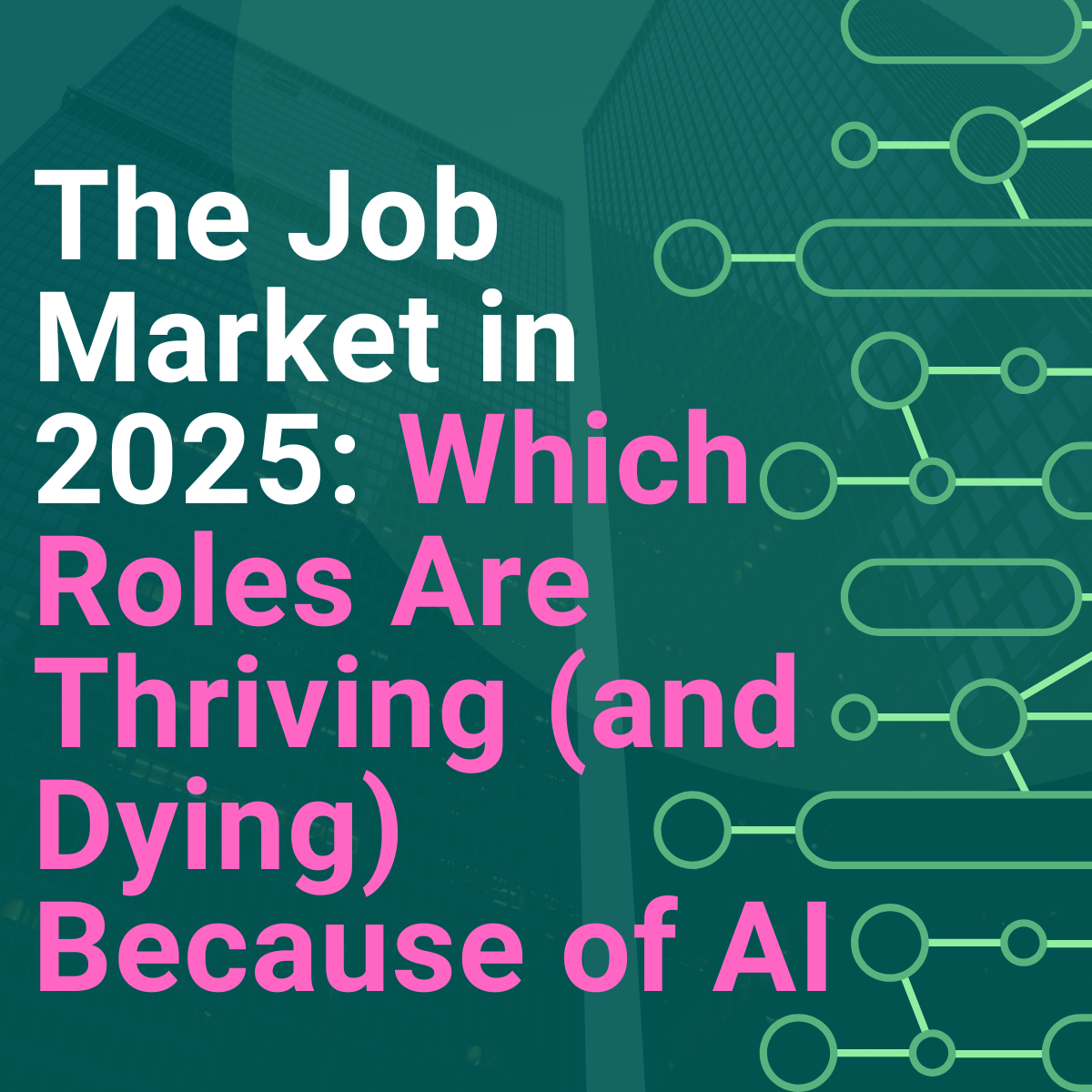Remember when you first saw a self-driving car in a movie and thought, “Wow, the future is here!”? Well, that future isn’t just about cars anymore—it’s in our offices, our factories, and even our creative studios. Artificial intelligence (AI) is no longer a sci-fi idea; it’s a powerful tool that’s rapidly changing the way we work.
In the last couple of years, especially since 2023, AI has grown up fast. Tools like ChatGPT and advanced image generators have moved from being cool experiments to being essential parts of many jobs. This rapid change has some people feeling excited about new opportunities and others feeling a little nervous about their jobs.
This article is your guide to understanding the job market in 2025, a world where AI is a major player. We’ll explore which jobs are becoming more important and valuable because of AI, and which ones are facing big changes or are even at risk. The goal is to give you a clear, honest look at what’s happening so you can make smart decisions about your own career, whether you’re just starting out or looking for a new path.
Understanding AI’s Impact on Employment
To see where the job market is headed, we first need to understand what AI is and how it’s changing things.
The Current State of AI Integration
AI isn’t just one thing. It’s a collection of technologies, and in 2025, we’re seeing three main types of AI reshaping the workplace:
- Automation: This is what most people think of. It’s about robots and software taking over repetitive, hands-on tasks, like assembling a car on a factory line or sorting through thousands of documents.
- Generative AI: This is the new, exciting kid on the block. It’s the technology behind tools like ChatGPT and Midjourney that can create new content—from writing articles and emails to designing images and writing computer code.
- Machine Learning: This is the “brain” of AI. It’s a process where computers learn from huge amounts of data to find patterns and make predictions. This is what helps a system recommend a new movie you might like or detect fraud in a bank transaction.
According to a 2025 analysis of businesses in Canada, AI adoption is on the rise. Over 12% of businesses reported using AI to produce goods or services, with a much higher rate in industries like information technology, professional services, and finance. While a large number of businesses (89.4%) reported no change to their total employment levels after implementing AI, nearly half (47.2%) said AI reduced the number of tasks employees used to do. This shows that AI isn’t just about replacing people; it’s often about changing their daily tasks to make them more efficient.
The speed of this transformation is something we haven’t seen before. Past technological shifts, like the invention of the internet, happened over many years. AI’s impact is happening much faster, almost in real time, which means we all have to be ready to adapt.
Key Factors Driving Job Market Changes
Why is AI changing the job market so quickly? A few key factors are at play:
- Cost Efficiency and Productivity: Businesses are using AI to get more done with less effort. Automating a task means it can be done faster, with fewer mistakes, and for a lower cost. This helps companies save money and become more productive.
- Skills Gaps: The rapid adoption of AI has created a new demand for skills that didn’t exist a few years ago. Companies are scrambling to find people who know how to work with AI, and this has created a big gap between the skills workers have and the skills companies need.
- Geographic Variations: The impact of AI isn’t the same everywhere. Big technology hubs are adopting AI faster than traditional manufacturing regions. Countries with strong regulations are also seeing different adoption rates than those with fewer rules.
Jobs That Are Thriving Because of AI
It’s easy to focus on the jobs that are disappearing, but the most important part of this story is the amazing new opportunities AI is creating. AI isn’t just taking over jobs; it’s creating new ones that require a unique blend of technical knowledge and human skills.
AI-Enhanced Professional Roles
These are the jobs that are directly involved with building, training, and managing AI systems.
- AI Prompt Engineers and Trainers: Think of a prompt engineer as a master communicator who knows how to “talk” to an AI. They’re experts at writing special instructions, or “prompts,” to get the best possible results from generative AI tools. They also train AI models to be more accurate and helpful. The demand for this role is soaring, with some senior engineers earning over $200,000 per year.
- Data Scientists and AI Specialists: These professionals are the backbone of AI. They collect, clean, and analyze the massive amounts of data that AI models need to learn. They also build and maintain the AI systems themselves. The job outlook for data scientists is very bright, with a projected growth of 36% from 2023 to 2033, which is much faster than the average for all jobs.
- Human-AI Collaboration Specialists: This is a new, emerging role. These specialists act as a bridge between people and AI, ensuring that the two work together smoothly. They design workflows where AI handles the repetitive tasks, and humans focus on the strategic, creative, and emotionally intelligent parts of the job.
Creative and Strategic Positions
You might think that AI would threaten creative jobs, but it’s actually making them more powerful.
- Content Strategists and Creative Directors: AI tools can now generate a ton of content, but they can’t create a compelling brand story or a brilliant marketing campaign. That’s where creative leaders come in. They use AI as a powerful assistant to generate ideas and content faster, allowing them to focus on the bigger picture and more innovative strategies.
- UX/UI Designers for AI Interfaces: As AI becomes a part of our daily lives, we need smart, talented designers to make sure the AI tools are easy and enjoyable to use. This is a growing field with a strong job outlook.
Healthcare and Human Services
AI is helping, not hurting, professions that require a human touch.
- AI-Assisted Healthcare Professionals: AI can help doctors and radiologists analyze medical scans faster and with incredible accuracy, which can lead to earlier and more precise diagnoses. This allows healthcare professionals to spend more time with patients and focus on the human side of care. Similarly, mental health professionals and eldercare workers are using AI to help them with administrative tasks, freeing them up for face-to-face interactions.
- AI Ethics and Compliance Officers: With AI becoming more common, there are new questions about what is fair and what is safe. These officers ensure that AI systems are developed and used in a responsible way, without bias or harm. It’s a critical new role with demand across many industries.
Technical Implementation and Maintenance
Behind every successful AI system are the people who build and maintain the technology.
- AI System Integrators and Consultants: These experts help companies figure out how to best use AI and then put the new technology into place. They are essential for businesses that want to keep up with the latest advancements.
- Cybersecurity Specialists (AI-focused): As AI systems become more widespread, protecting them from hackers and cyberattacks is more important than ever. Cybersecurity professionals who specialize in AI are in very high demand.
Jobs at Risk or Declining
While AI is creating new jobs, it’s also changing or reducing the need for other roles. This isn’t necessarily a bad thing, as it allows people to transition to more meaningful and creative work, but it does require careful planning.
Routine Cognitive Tasks
These are jobs that involve repetitive, predictable work that AI can do much faster and more accurately.
- Data Entry and Basic Analysis Roles: AI has become very good at sifting through data, entering information, and performing basic analysis. This means that jobs focused solely on these tasks are likely to be automated. However, workers in these roles can transition to more specialized positions, like data management, by learning new skills such as using tools like Python and SQL.
- Basic Customer Service Representatives: AI-powered chatbots and virtual assistants are now handling a large volume of simple customer questions, such as billing inquiries or password resets. This is freeing up human agents to focus on more complex problems that require empathy and a personal touch. Workers in this field can reskill to become “customer success” specialists who manage client relationships and solve bigger issues.
Manufacturing and Logistics
Automation has been a part of these industries for a long time, but AI is accelerating the change.
- Assembly Line Workers: While AI and robotics are still not perfect, they are becoming increasingly capable of performing a variety of assembly-line tasks. The impact of this is different depending on the region, but many companies are investing in retraining programs to help workers transition to other roles, such as maintaining the new robotic systems.
- Transportation and Delivery Roles: The development of autonomous vehicles is a long-term trend that could eventually change the need for certain drivers. While fully self-driving cars are still in the future for many areas, AI-powered route optimization and smart warehousing are already transforming logistics jobs.
Financial Services
The financial world is all about data, which makes it a perfect fit for AI.
- Basic Accounting and Bookkeeping: AI can automate many of the routine tasks in accounting, such as processing invoices and tracking expenses. This is shifting the role of the accountant from a data-entry specialist to a strategic advisor who uses AI tools to help clients make smart financial decisions.
- Traditional Banking Roles: Routine tasks in bank branches, like processing transactions, are being replaced by digital banking tools and AI systems. This is creating a demand for new roles that can help customers with more complex financial planning and technology-related issues.
Administrative Support
AI is a fantastic administrative assistant, which is changing the nature of many support roles.
- Traditional Administrative Assistants: AI can now schedule meetings, write emails, and summarize documents. This is reducing the demand for assistants who only perform these tasks. The role is evolving to become more of a project manager or a human resources partner, where people skills and strategic thinking are more important.
The Gray Zone: Jobs Being Transformed
Some jobs aren’t at risk of disappearing, but they are changing in big ways. For these roles, learning to work with AI isn’t optional—it’s essential for staying competitive.
- Education Sector: AI is becoming a powerful teaching assistant. It can create personalized learning plans, grade assignments, and provide instant feedback to students. This allows teachers to spend less time on administrative tasks and more time on mentoring students and inspiring them to think creatively.
- Marketing and Sales: AI can now create content, analyze customer data, and predict what a customer might want to buy. Digital marketers and salespeople who learn to use these tools effectively will have a huge advantage. The focus for these roles is shifting from the hands-on work of creating content to the strategic work of building relationships and creating a compelling brand.
- Legal and Professional Services: AI can review thousands of legal documents in seconds, a task that used to take junior lawyers and paralegals countless hours. This means that these professionals are now focusing on higher-value legal work, such as arguing cases and developing legal strategies.
Skills for the AI-Driven Job Market
The message is clear: if you want to succeed in the future, you need to learn to work with AI. But what does that really mean?
Technical Skills in Demand
- AI Literacy and Tool Proficiency: You don’t have to be a computer scientist, but you do need to understand how AI works and how to use the tools that are relevant to your field.
- Data Analysis and Interpretation: Being able to look at data and understand what it’s telling you is a skill that will only become more valuable.
- Programming Languages: Learning a language like Python or SQL can give you a major advantage, as these are the building blocks of many AI systems.
Soft Skills That Matter More
These are the uniquely human skills that AI can’t replicate.
- Critical Thinking and Complex Problem Solving: AI can give you a ton of information, but a human is still needed to ask the right questions, analyze the results, and come up with innovative solutions.
- Emotional Intelligence and Interpersonal Communication: As AI handles more routine tasks, the ability to build relationships, communicate effectively, and lead a team will be more important than ever.
- Adaptability and a Continuous Learning Mindset: The world is changing fast, and the most successful people will be those who are open to new ideas and are always willing to learn.
Preparing for the Future
The best way to deal with the changes AI is bringing is to be proactive.
- Career Transition Strategies: If you’re in a job that might be at risk, start thinking about your transferable skills. If you’re a data entry clerk, you have an incredible understanding of data, which is a valuable skill for a data analyst. You can use online courses to build on what you already know.
- Educational Pathways: Universities and online learning platforms are creating new programs and certifications specifically designed to help people work in an AI-driven world. Look for “micro-credentials” or “nanodegrees” that teach specific skills quickly.
- Staying Competitive: The key is to never stop learning. Follow industry trends, join online communities, and experiment with AI tools. The more you embrace these new technologies, the more valuable you’ll become.
The job market in 2025 is a mix of exciting opportunities and real challenges. AI is a powerful force that is changing everything, but it is not a force to be feared. Instead, it is a tool to be understood and used.
The jobs that are thriving aren’t about avoiding AI; they’re about learning to work with it. The human skills that AI can’t replicate—like creativity, critical thinking, and empathy—will become even more valuable in the years to come.
So, instead of worrying about the future, take action. Start learning a new skill, explore an AI tool, or talk to someone in a field that interests you. The future of work isn’t about people versus machines; it’s about people and machines working together to build a better, more efficient world. The choice to adapt is yours.


